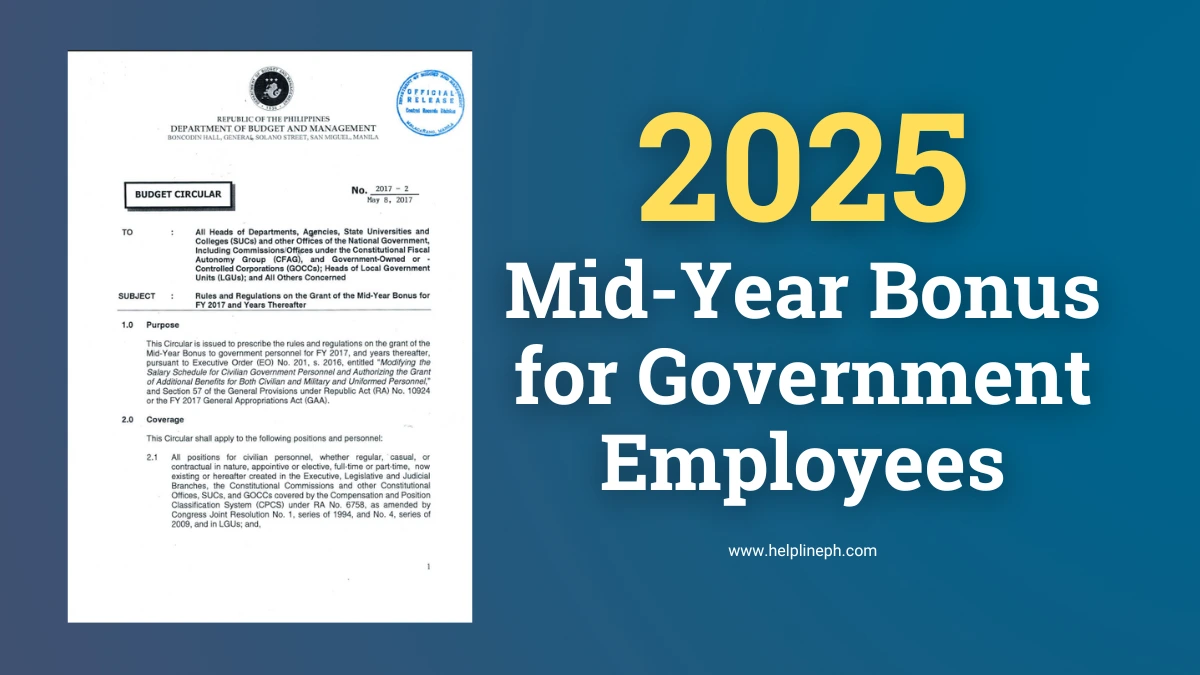Government Workers to Receive Mid-Year Bonus Starting May 15
A document known as the Budget Circular includes specific rules about how government employees can receive a mid-year bonus. Here, we will explain what these rules are and how they work in a straightforward manner.
What is a Mid-Year Bonus?
A mid-year bonus is additional money that government employees receive around the middle of the year. This bonus is awarded to employees as a way of recognizing their hard work and to help boost their motivation.
Who Can Receive the Mid-Year Bonus?
Not every government employee automatically gets this bonus. There are certain conditions that need to be met:
Employment Status: The employee must be working on a regular basis and not just temporarily.
Performance: The employee should meet certain performance standards set by their department.
Duration of Service: The employee must have worked for a certain period of time, usually at least four months, by the middle of the year.
How is the Bonus Calculated?
The bonus amount is typically equivalent to one month’s basic salary. This means if an employee earns a certain amount as their regular salary each month, they get the same amount as their mid-year bonus.
Why is the Bonus Important?
The mid-year bonus is important for several reasons:
Financial Help: It provides financial assistance to employees, helping them manage their expenses better.
Motivation: Receiving a bonus can make employees feel valued and appreciated, which can encourage them to work harder.
Economic Boost: When employees spend their bonus, it helps stimulate the economy by increasing consumer spending.
Summary
The Budget Circular defines how mid-year bonuses are handled for government employees. By setting clear rules, the government ensures that the bonus system is fair and beneficial for both the employees and the broader economy. This bonus is not just about giving extra money, but it is also a tool used by governments to maintain a satisfied and motivated workforce.
FAQs
Here are some commonly asked questions and answers about the mid-year bonus for government employees to help clarify how it works and who qualifies for it.
1. What is a mid-year bonus?
A mid-year bonus is additional compensation given to government employees around the middle of the year. It’s intended to recognize their hard work and to motivate continued performance.
2. Who is eligible for the mid-year bonus?
Eligibility for the mid year bonus typically includes:
- Regularly employed government workers (not contractual or temporary).
- Employees who have served a minimum required period, usually at least four months of service by the middle of the year.
- Employees who meet performance criteria set by their respective departments.
3. How much is the mid-year bonus?
The mid-year bonus generally equals one month’s basic salary. This means the bonus is computed based on the employee’s current monthly salary at the time the bonus is awarded.
4. When is the mid year bonus given?
The mid-year bonus is typically distributed around the middle of the year, though the exact month can vary depending on the government’s budgetary disbursements and regulations.
5. Are part-time employees eligible for the mid year bonus?
Part-time employees may be eligible for the mid-year bonus, but this can depend on specific government policies and the terms of employment. Often, the bonus for part-time employees is prorated based on their hours worked.
6. What happens if I started working after the eligibility cutoff date?
Employees who start working after the eligibility cutoff date will generally not receive the mid-year bonus for that year but will be eligible in subsequent years if they meet other eligibility criteria.
7. Can the mid year bonus be denied?
Yes, the mid-year bonus can be denied if an employee does not meet the performance requirements or if budgetary constraints prevent the disbursement of bonuses.
8. Is the mid year bonus taxed?
The taxation of the midyear bonus depends on local tax laws. In some jurisdictions, bonuses up to a certain amount may be tax-exempt, while amounts exceeding that limit may be taxable.
9. Can I appeal if I do not receive the mid year bonus?
If you believe you were unfairly denied a midyear bonus, you may have the option to appeal. Check with your HR department or union representative for the appeal process specific to your department or agency.
10. How does the mid year bonus affect my pension or retirement benefits?
Typically, bonuses do not affect the calculation of pension or retirement benefits, which are usually based on base salary. However, specific effects can vary depending on the regulations governing retirement benefits in your sector.
These FAQs aim to clarify common queries about the mid-year bonus and help government employees understand their entitlements and the procedures involved.
Source: DBM






